To find more about our students, either scroll down the page or click on one of the four priority areas each student's research is located in. The thematic cohorts for 2014 are:
Agriculture and Food Security
Industrial Biotechnology and Bioenergy
Bioscience for Health
World Class Underpinning Bioscience
***
Agriculture and Food Security
Emma Bradford (Aberdeen)
Project title: How does deformed wing virus change as it passes between honey bees and Varroa?
Personal note: Hi! I am currently studying for my PhD at the University of Aberdeen, School of Biological Sciences. My project involves investigating the interactions between the honeybee virus Deformed Wing Virus, and a parasitic mite of the European honeybee Varroa destructor. Our aim is to understand the complex relationship between the two, how this relationship has affected the impact that the virus has on honeybee health, and the mechanisms involved in these changes. My project is carried out in association with the EASTBIO BBSRC DTP, the National Bee Unit (FERA) and the Eastern Region Association’s Studentship (EARS2) with Morley Agricultural Foundation.
Adam Clement (Edinburgh)
Project title: Identifying interacting genetic loci through their evolutionary signatures
Kathryn Grant (Edinburgh)
Project title: Mechanically induced developmental plasticity in plants: Its mechanisms and application to sustainable agricultural improvement
Estela Domingo Torres (Aberdeen)
Project title: The role of alternative splicing and nonsense-mediated-decay on the regulation of resistance genes in potato upon challenge with Phytophthora infestans
Industrial Biotechnology and Bioenergy
Holly Corrigall (Aberdeen) Project title: Using Synthetic Biology for Real-Time Monitoring and Optimisation of the Yeast Microbial Cell Factory
Project title: Using Synthetic Biology for Real-Time Monitoring and Optimisation of the Yeast Microbial Cell Factory
Personal note: Hi there! I am currently studying for my PhD at the University of Aberdeen as part of the EASTBIO doctoral training partnership. My project involves using synthetic biology for real-time monitoring and optimisation of the yeast microbial cell factory. I’m hoping to design novel synthetic circuits which can diagnose and then signal the nature of translation system dysfunction caused by high expression of heterologous proteins. Previous to this, I studied at the University of Dundee where I gained my undergraduate degree in Forensic Anthropology. I then undertook an internship studying NanoBiology at the Institute of Medical Science and Technology in Dundee before completing a Master’s degree in Systems and Synthetic Biology at the University of Aberdeen. I spend my spare time looking after my horse and socialising with friends.
Matthew Dale (Edinburgh)
Project title: Design and construction of electrogenic cell-based biosensors for pathogens and toxins
Amy Learmonth (Dundee)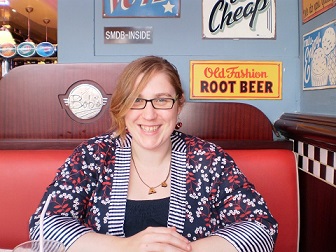 Personal note: Hi! I’m Amy, a PhD student at the University of Dundee. I took my Bachelor’s in Plant Science (International) at the University of Leeds, my home city, and spent an Erasmus exchange year at Wageningen University in the Netherlands. I enjoyed it so much I went back to Wageningen for a Master’s degree again in Plant Science (Plant Breeding and Genetic Resources). I stayed in the Netherlands for another six years working as a research assistant in a molecular marker lab for a vegetable seed breeding company. I returned to the UK and came to Dundee to work on a project in barley. The aim of the project is to improve barley straw for use in the production of biofuel. In my spare time I like cross stitching, antiquing and visiting friends all around the world.
Personal note: Hi! I’m Amy, a PhD student at the University of Dundee. I took my Bachelor’s in Plant Science (International) at the University of Leeds, my home city, and spent an Erasmus exchange year at Wageningen University in the Netherlands. I enjoyed it so much I went back to Wageningen for a Master’s degree again in Plant Science (Plant Breeding and Genetic Resources). I stayed in the Netherlands for another six years working as a research assistant in a molecular marker lab for a vegetable seed breeding company. I returned to the UK and came to Dundee to work on a project in barley. The aim of the project is to improve barley straw for use in the production of biofuel. In my spare time I like cross stitching, antiquing and visiting friends all around the world.
Piera Marchetti (Edinburgh)
Project title: Exploring, expanding and exploiting PLP-dependent enzymes
Personal note: Hi, I’m Piera and my research project fits into the Bioenergy and Industrial Biotechnology strategic priority area which I am doing at the University of Edinburgh in the Campopiano group. I will be focusing on enzymes involved in natural product biosynthesis, specifically, the biosynthesis of the tambjamines, a set of molecules with antibiotic and immunosuppressant activity. My project will focus on TamD, a PLP-dependent enzyme which along with other enzymes in the Tam cluster has great potential for industrial biotechnological applications as it forms a biologically important bipyrrole moiety. Prior to this, I carried out my MChem in Chemical Biology at the University of Warwick.
Holly Rore (Aberdeen)
Project title: In vitro derivation of sperm from pluripotent stem cells
Personal note: Hi! I’m a student at the University of Aberdeen and I am currently studying for my PhD funded by the BBSRC. I’m a developmental and cell biologist within EASTBIO’s Industrial Biotechnology theme with a particular interest in pluripotent stem cells (PSCs) and how they can be used to treat various disorders. As part of my project, I will identify changes in gene expression in differentiating germ cells and the culture conditions required to facilitate their differentiation from PSCs. My aim is to ultimately produce functional spermatozoa which could be used to develop an alternative treatment for infertility.
Ben Rutter (Aberdeen)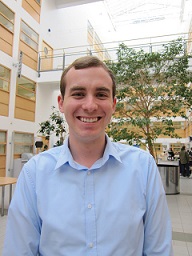 Project title: Exploring and exploiting the biosynthesis of myriocin, a potent fungal metabolite
Project title: Exploring and exploiting the biosynthesis of myriocin, a potent fungal metabolite
Personal note: I graduated in 2014 with an Honours degree in Genetics from the University of Aberdeen after which I remained at Aberdeen to begin my PhD in the Aberdeen Fungal Group. My project focuses on the fungal metabolite myriocin. Myriocin is a secondary metabolite produced by at least 4 fungal species including the fungus I will primarily be working on, Isaria sinclairii. Its activity as a potent immunosuppressant and inhibitor of sphingosine biosynthesis has been exploited in cell biology research since 1972 but, unlike many complex bioactive metabolites, myriocin has successfully undergone a medicinal chemistry design programme. This resulted in the development of FTY720 (Fingolimod), an effective oral treatment for multiple sclerosis. Myriocin has exciting potential for further development and in particular the intermediate products and bioconversions in its biosynthetic pathway are unknown and may yield interesting enzymes to exploit. For these reasons then, my project sits within the industrial biotechnology remit of the BBSRC as the aim is to derive medicinal/industrial chemicals from living organisms.
Erika Abbondati (Edinburgh)
Project title: Effect of microenvironment on osteoclast driven bone resorption
Personal note: Hi All, I’m Erika. I am a vet, a pathologist and since October 2014 I also am a PhD at the Roslin Institute in Edinburgh. For the next 4 years I’ll be looking into the effect of the microenvironment on the osteoclast driven bone resorption. My project will gain a better understanding of the mechanisms underlying the osteoclasts activation and resorptive activity.
Edward Ivimey-Cook (Edinburgh)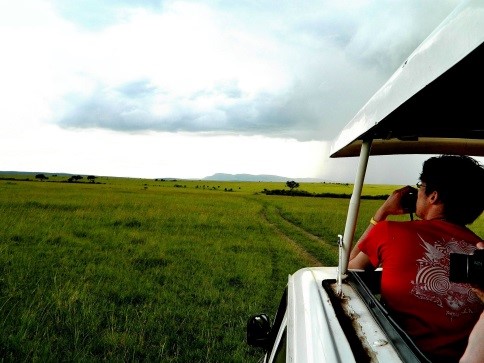 Project title: Social interaction effects on lifespan and ageing in burying beetles
Project title: Social interaction effects on lifespan and ageing in burying beetles
Personal note: Hi! I’m Ed, and I’m currently studying for my PhD at the University of Edinburgh’s Institute for Evolutionary Biology. Over the next four years I’ll be studying social interaction effects and ageing in the burying beetle by using quantitative genetics and animal modelling. Previous to this, I studied at the University of Exeter, Cornwall Campus, where I gained my MSc in Evolutionary and Behavioural Ecology. Outside of the lab I enjoy cooking, travelling, coffee and lots of different sports.
Lucas J. Morales Moya (Dundee)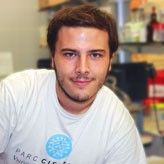 Project title: Somitogenesis on a chip
Project title: Somitogenesis on a chip
Personal note: Hi! I am Lucas, a PhD Student at the University of Dundee with an EASTBIO studentship in Ageing. I did my undergraduate in Biotechnology at University of Valencia (Spain) and my master in Biophysics at Universidad Autónoma de Madrid (Spain). I really enjoy doing interdisciplinary research. My main research focus is the development of newer tools to study somitogenesis, combining techniques from different fields such as biology, maths, computer science and physics. Also, I have been involved in the Valencia Biocampus iGEM team as a student in 2012 and as advisor in 2013 and 2014. This year I will be participating in the Dundee Team as advisor.
Reyes Sanles-Falagan (St Andrews)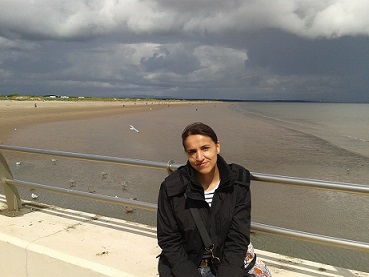 Project title: Transcription Factor IIH: at the Nexus of Transcription and DNA Repair
Project title: Transcription Factor IIH: at the Nexus of Transcription and DNA Repair
Personal note: Hi! My name is Reyes Sanles-Falagan and I’m a PhD student at Prof. Malcolm White lab at the University of St Andrews. My project focuses on the study of TFIIH, a ten-subunit complex that participates in Nucleotide Excision Repair (NER). Mutations in the XPB, XPD or p8 subunits of TFIIH cause a series of autosomal recessive disorders with symptoms that range from premature ageing to neurological defects and a 1000-fold increased susceptibility to suffer from skin cancer. Although TFIIH has been the object of intense study for the past two decades, a lot of questions remain unanswered, and I hope that this project will help to better understand the DNA repair process and the causes behind the different phenotypes associated to the autosomal syndromes caused by TFIIH mutations. In my spare time I enjoy reading a good book, watching one of the TV shows I’m following right now, and walking around the gorgeous Scottish countryside.
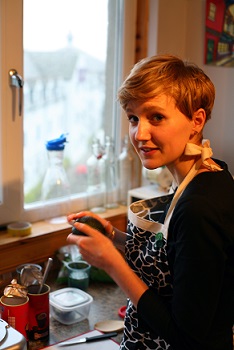 Frances Vaughan (Aberdeen)
Frances Vaughan (Aberdeen)
Project title: Cold-sensing mechanisms in fat cells
Personal note: My PhD is based in the Rowett Institute of Nutrition and Health at the University of Aberdeen. I am studying the regulation of nonshivering thermogenesis, the process by which energy is burned to produce heat in fat cells. In particular, we are interested in the link between temperature-sensing and heat production. Our aim is to aid the development of new treatments for obesity which increase energy expenditure through thermogenesis. Outside of the lab, I am an editor for the University of Aberdeen science magazine and the founder of Seasoned Students, an organisation which seeks to promote healthy eating amongst university students.
World Class Underpinning Bioscience
Omar Alfituri (Edinburgh) Project title: Dissecting the lymphatic invasion and systemic dissemination in African trypanosomes
Project title: Dissecting the lymphatic invasion and systemic dissemination in African trypanosomes
Personal note: Hello, I graduated with a BSc. with honours in Immunology from the University of Edinburgh in 2013. My PhD project involves studying the host-parasite interactions occurring during the early stages of African trypanosome infections. African trypanosomes are single-cell extracellular hemoflagellate protozoan parasites and are the etiological agents of African Trypanosomiasis (AT), causing sleeping sickness in humans and nagana in livestock. Trypanosoma brucei are transmitted via tsetse flies of the genus Glossina, with the subspecies T. b. rhodesiense and T. b. gambiense causing human AT (HAT) in endemic regions across sub-Saharan Africa with more than 57 million people at risk within the African tsetse fly belt. African Animal Trypanosomiasis (AAT) can also be caused by Trypanosoma congolense, Trypanosoma vivax, and T. brucei, inflicting substantial economic strains on the African livestock industry as the prevalence of the livestock disease is 100 to 150-fold higher than HAT. Trypanosomiasis disease occurs in two stages: the haemolymphatic stage and the meningoencephalitic stage. The former occurs as the extracellular parasites invade the circulatory and lymphatic systems and disseminates systemically from the draining lymph nodes. The latter occurs as the parasite passes the blood-brain-barrier and invades the central nervous system (CNS). If left untreated, this results in sleeping sickness which manifests as sleep cycle disruption and neurological abnormalities that may lead to coma, organ failures and death. Current treatments possess high toxicity risks and delivery problems, therefore novel treatments and vaccinations are eagerly sought after. My project aims to: elucidate the host-pathogen interactions occurring within the skin, draining lymph nodes (LN) and lymphatics; characterise the host molecular and cellular factors which may aid parasite systemic dissemination; and elucidate which components of host immunity are critical in deterring trypanosome infection establishment. This project will hopefully unveil novel opportunities for future studies and treating African Trypanosomiasis.
John Hunter Allan (Dundee)
Project title: Signalling and regulation of bacterial virulence
Stevie Bain (Edinburgh)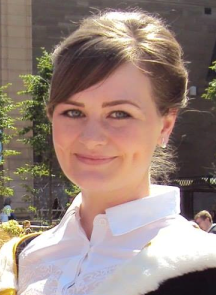 Project title: Parent-of-origin specific genomic exclusion in insects
Project title: Parent-of-origin specific genomic exclusion in insects
Personal note: Hi! I’m a PhD student at the University of Edinburgh’s Institute of Evolutionary Biology. During my 4-year undergraduate degree at the University of Dundee I had an interest in sexual reproduction and its variability across life and this formed the basis of my Honours Project. Throughout my 4 years at Edinburgh, I will be investigating the epigenetic machinery underlying the phenomenon of paternal genome elimination, an example of asymmetric reproduction, in the citrus mealybug. In my spare time I enjoy being active and love to travel. A healthy combination of yoga and Netflix keeps me calm when the workload gets a bit stressful!
Thomas Booker (Edinburgh)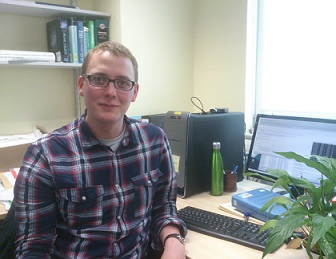 Project title: Resolving the mystery of missing heritability
Project title: Resolving the mystery of missing heritability
Personal note: I'm a PhD student at the University of Edinburgh in the Institute of Evolutionary Biology. I am from the Scottish Borders, near the town of Duns. I completed my undergraduate training at the University of Stirling, where I worked on the ecology of a newly evolved species of flowering plant. Since then I have become very interested in population genetics; first with my MSc in Evolutionary Genetics at Edinburgh looking at the evolution of mimicry and continuing with my PhD studies. My PhD is tentatively titled: "Understanding the Contribution of Background Selection to Patterns of Diversity In the Mouse Genome". Basically my project will attempt to increase our understanding of what particular evolutionary forces cause genetic diversity within the mouse genome to vary.
 Lindsey Caldwell (Edinburgh)
Lindsey Caldwell (Edinburgh)
Project title: Neuroprotection and Neuroregeneration of Dopaminergic Neurons in Zebrafish
Personal note: Hi! I'm Lindsey, and I'm based at the Little France campus of the University of Edinburgh. Before starting my PhD I studied Physiological Sciences at the University of Oxford followed by an MSc Neuroscience at King's College London. Both my undergraduate and master’s projects were cell culture based experiments, and although there are many advantages to working in vitro, I wanted to expand my technical expertise. I therefore chose a PhD project where I could apply my interest in neurodegenerative diseases to an in vivo system. Unlike mammals, zebrafish are able to regenerate dopaminergic neurons, the cell type which is lost in people with Parkinson’s disease. I’m investigating how zebrafish are able to do this and looking at ways to protect these neurons from cell death, all with the hope of informing a future treatment for Parkinson’s disease.
James Clugston (Edinburgh)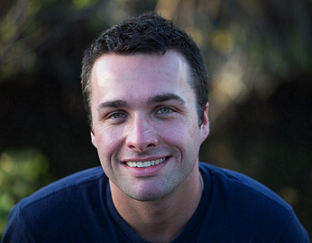 Project title: Exploring new approaches for conservation genetics of the genus Cycas L. (Cycadaceae) in Australia
Project title: Exploring new approaches for conservation genetics of the genus Cycas L. (Cycadaceae) in Australia
Personal note: My research is focused on understanding the genetic and genomic diversity of cycads — a group of plants with an ancient fossil record [or something general for the lay-‐person/non botanist]. More specifically, this work involves the genus Cycas (Cycadaceae), which is the most diverse group of the cycads. My PhD project aims to apply new approaches such as next generation sequencing technologies to better understand the genetic diversity in wild populations of Cycas in Australia. The project will also compare the complete genetic reserves of wild populations with the ex-‐situ conservation collections in order to understand how the cultivated collections represent the genetic diversity of the natural wild populations. Ultimately the project aims to create a conservation strategy to best preserve natural populations of Cycas.
Alex Finney (Dundee)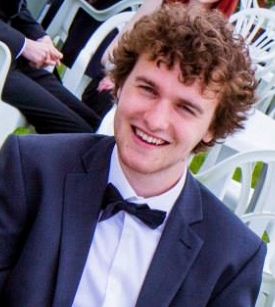 Project title: Exploring bacterial hydrogenases for biotechnology and biomedical applications
Project title: Exploring bacterial hydrogenases for biotechnology and biomedical applications
Personal note: Hello, I was born near Liverpool and then moved south to complete my GCSE’s and A-levels before starting my Undergraduate degree at the University of Dundee in Molecular Biology. I am staying in Dundee to complete my PhD in the division of Molecular Microbiology (MMB) looking into how bacteria can be utilised to address current worldwide problems. Outside of the lab I like to be particularly social and enjoy sports like football, badminton, golf and anything a bit new!
Amy Fraser (Edinburgh) Project title: The function of the TALPID3 protein during embryonic development
Project title: The function of the TALPID3 protein during embryonic development
Personal note: Hi! I’m Amy, a student at the Roslin Institute, Edinburgh University. My PhD is aimed at better understanding the function and localisation of Talpid3 protein. Talpid3 is a centrosomal protein, which plays a role in centrosome orientation and migration, and in ciliogenesis and Hedgehog pathway signal transduction. Outside of the lab I enjoy cooking, running, music and socialising.
Iain Hunter (Edinburgh)
Project title: Signalling in proprioceptors
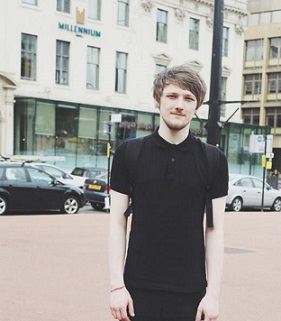 Bobby Innes (St Andrews)
Bobby Innes (St Andrews)
Project title: The multimodal estimate of gaze: Fixed or flexible?
Personal note: I’m studying in the School of Psychology and Neuroscience at the University of St. Andrews, under the supervision of Dr. Daniela Balslev and Dr. Thomas Otto. My PhD concerns how the brain estimates eye position within the head. This is important for keeping track of objects in the visual scene, so we can attend to and interact with them. Previous research has identified two neural gaze signals: corollary discharge (a rapidly-available copy of the eye-movement command) and oculoproprioception (the slower, but more accurate, feedback from eye muscles regarding eye position). Over these 4 years, I hope to elaborate on our understanding of these signals, and (crucially) look into which signal the brain uses depending on behavioural task demands e.g. prioritising speed or accuracy of responding. To do this, I will use cognitive neuroscience techniques with human volunteers, particularly transcranial magnetic stimulation (a safe and non-invasive method of transiently manipulating neuronal activity in areas of the brain).
Kaja Kostanjevec (Aberdeen)
Project title: Building an artificial cornea: Modelling stem cell activity and cell migration in the eye
Personal note: Hello, my name is Kaja Kostanjevec and I am a PhD student at the University of Aberdeen. I have completed my BSc (Hons) in Genetics (Immunology) at the same university in 2014. My honours project gave me a continued interest in research, leading me to my current PhD. My PhD is part of the EASTBIO doctoral training partnership and it is classed under their ‘World class underpinning bioscience’ theme. During my project we aim to model an artificial cornea, with the combined efforts of programming and laboratory work. If you are interested in my research and would like to chat, contact me at the address below.
Andrew Runcie (Dundee)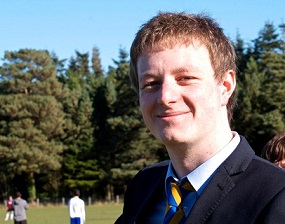 Project title: Chemical & Structural Biology of Protein-Protein Interactions: Ligandability of Tandem Domain Proteins
Project title: Chemical & Structural Biology of Protein-Protein Interactions: Ligandability of Tandem Domain Proteins
Personal note: Hello, I’m Andrew – a PhD student in the Ciulli lab at the University Of Dundee College Of Life Science. My PhD project concerns protein-protein interactions, specifically those between acetylated histone tails and bromodomains. Currently I am involved in the development of a chemical-genetic ‘bump-and-hole’ method that will allow selective inhibition of all bromodomains in the BET family. Before this I received my honours degree in Molecular Biology from the University of St Andrews, where I undertook an honours research project utilising single-molecule fluorescence microscopy to investigate the bacterial SAM-I riboswitch. During my undergraduate degree I also carried out an internship at the Scottish Trace Elements and Micronutrient Reference Laboratory (STEMRL); where I collected raw data for a study into the potential correlations between oesophagectomies, atrial fibrillation and plasma levels of the metabolite asymmetric-dimethylarginine (ADMA).
Stephen Smith (Edinburgh)
Project title: Robustness of synthetic biochemical logic to molecular noise
Leili Soo (Aberdeen)
Project title: Exploring the neural basis of visual crowding
David Walker (St Andrews)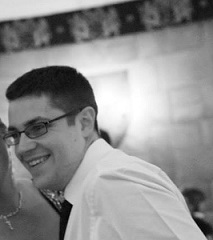 Project title: Stress on the brain: implications for cognitive ageing
Project title: Stress on the brain: implications for cognitive ageing
Personal note: I graduated in 2008 with an honours degree in Zoology from the University of Dundee. Up until the start of my PhD, I worked as a research technician in laboratories at the University of Dundee during which I also carried out an MSc research project. My PhD is looking at how stress impacts on cognitive ageing throughout different stages of life. I am particularly interested in which molecular mechanisms and gene expression programs are implicated in the neuroendocrine processes. What attracted me to this project is the opportunity to combine both my zoological and biochemical interests into an exciting project that has potential far-reaching implications and scope for collaboration. I hope to use my PhD to further my career in academia by becoming a lecturer and independent researcher and I believe the EASTBIO DTP programme provides an excellent platform for me to achieve this. I am married with two young daughters who always keep me on my toes! My other interests include sport (mainly football, formula 1 and wrestling), video games and watching TV shows/movies (mainly The Walking Dead!). I feel privileged to be the EASTBIO 2014 rep for St Andrews.











